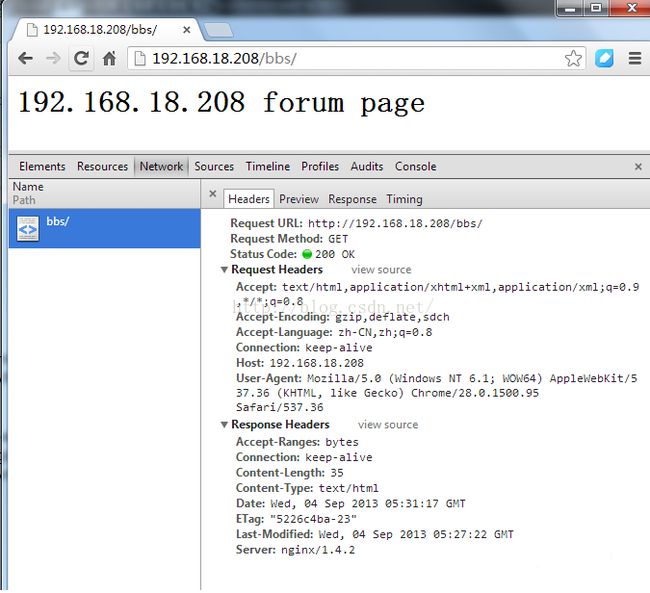Nginx之URL重写
1.URL重写模块(Rewrite)
摘要
这个模块允许使用正则表达式重写URI(需PCRE库),并且可以根据相关变量重定向和选择不同的配置。如果这个指令在server字段中指定,那么将在被请求的location确定之前执行,如果在指令执行后所选择的location中有其他的重写规则,那么它们也被执行。如果在location中执行这个指令产生了新的URI,那么location又一次确定了新的URI。这样的循环可以最多执行10次,超过以后nginx将返回500错误。
指令
break
语法:break
默认值:none
使用字段:server, location, if
完成当前设置的规则,停止执行其他的重写指令。
示例:
|
1
2
3
4
|
if
($slow) {
limit_rate 10k;
break
;
}
|
if
语法:if (condition) { … }
默认值:none
使用字段:server, location
注意:在使用if指令之前请查看if is evil page并且尽量考虑用try_files代替。
判断一个条件,如果条件成立,则后面的大括号内的语句将执行,相关配置从上级继承。
可以在判断语句中指定下列值:
-
一个变量的名称;不成立的值为:空字符传”“或者一些用“0”开始的字符串。
-
一个使用=或者!=运算符的比较语句。
-
使用符号~*和~模式匹配的正则表达式:
-
~为区分大小写的匹配。
-
~*不区分大小写的匹配(firefox匹配FireFox)。
-
!~和!~*意为“不匹配的”。
-
使用-f和!-f检查一个文件是否存在。
-
使用-d和!-d检查一个目录是否存在。
-
使用-e和!-e检查一个文件,目录或者软链接是否存在。
-
使用-x和!-x检查一个文件是否为可执行文件。
正则表达式的一部分可以用圆括号,方便之后按照顺序用$1-$9来引用。
示例配置:
|
1
2
3
4
5
6
7
8
9
10
11
12
13
14
15
16
17
18
19
20
21
22
23
24
25
26
27
28
|
if
($http_user_agent ~ MSIE) {
rewrite ^(.*)$
/msie/
$1
break
;
}
if
($http_cookie ~*
"id=([^;] +)(?:;|$)"
) {
set
$
id
$1;
}
if
($request_method = POST ) {
return
405;
}
if
(!-f $request_filename) {
break
;
proxy_pass http:
//127
.0.0.1;
}
if
($slow) {
limit_rate 10k;
}
if
($invalid_referer) {
return
403;
}
if
($args ~ post=140){
rewrite ^ http:
//example
.com/ permanent;
}
|
内置变量$invalid_referer用指令valid_referers指定。
return
语法:return code
默认值:none
使用字段:server, location, if
这个指令结束执行配置语句并为客户端返回状态代码,可以使用下列的值:204,400,402-406,408,410, 411, 413, 416与500-504。此外,非标准代码444将关闭连接并且不发送任何的头部。
rewrite
语法:rewrite regex replacement flag
默认值:none
使用字段:server, location, if
按照相关的正则表达式与字符串修改URI,指令按照在配置文件中出现的顺序执行。
可以在重写指令后面添加标记。
如果替换的字符串以http://开头,请求将被重定向,并且不再执行多余的rewrite指令。
尾部的标记(flag)可以是以下的值:
-
last - 完成重写指令,之后搜索相应的URI或location。
-
break - 完成重写指令。
-
redirect - 返回302临时重定向,如果替换字段用http://开头则被使用。
-
permanent - 返回301永久重定向。
注意如果一个重定向是相对的(没有主机名部分),nginx将在重定向的过程中使用匹配server_name指令的“Host”头或者server_name指令指定的第一个名称,如果头不匹配或不存在,如果没有设置server_name,将使用本地主机名,如果你总是想让nginx使用“Host”头,可以在server_name使用“*”通配符(查看http核心模块中的server_name)。例如:
|
1
2
3
|
rewrite ^(
/download/
.*)
/media/
(.*)\..*$ $1
/mp3/
$2.mp3 last;
rewrite ^(
/download/
.*)
/audio/
(.*)\..*$ $1
/mp3/
$2.ra last;
return
403;
|
但是如果我们将其放入一个名为/download/的location中,则需要将last标记改为break,否则nginx将执行10次循环并返回500错误。
|
1
2
3
4
5
|
location
/download/
{
rewrite ^(
/download/
.*)
/media/
(.*)\..*$ $1
/mp3/
$2.mp3
break
;
rewrite ^(
/download/
.*)
/audio/
(.*)\..*$ $1
/mp3/
$2.ra
break
;
return
403;
}
|
如果替换字段中包含参数,那么其余的请求参数将附加到后面,为了防止附加,可以在最后一个字符后面跟一个问号:
|
1
|
rewrite ^
/users/
(.*)$
/show
?user=$1? last;
|
注意:大括号({和}),可以同时用在正则表达式和配置块中,为了防止冲突,正则表达式使用大括号需要用双引号(或者单引号)。例如要重写以下的URL:
|
1
|
/photos/123456
|
为:
|
1
|
/path/to/photos/12/1234/123456
.png
|
则使用以下正则表达式(注意引号):
|
1
|
rewrite
"/photos/([0-9] {2})([0-9] {2})([0-9] {2})"
/path/to/photos/
$1/$1$2/$1$2$3.png;
|
如果指定一个“?”在重写的结尾,Nginx将丢弃请求中的参数,即变量$args,当使用$request_uri或$uri&$args时可以在rewrite结尾使用“?”以避免nginx处理两次参数串。
在rewrite中使用$request_uri将www.example.com重写到example.com:
|
1
2
3
4
|
server {
server_name www.example.com;
rewrite ^ http:
//example
.com$request_uri? permanent;
}
|
同样,重写只对路径进行操作,而不是参数,如果要重写一个带参数的URL,可以使用以下代替:
|
1
2
3
|
if
($args ^~ post=100){
rewrite ^ http:
//example
.com
/new-address
.html? permanent;
}
|
注意$args变量不会被编译,与location过程中的URI不同(参考http核心模块中的location)。
rewrite_log
语法:rewrite_log on | off
默认值:rewrite_log off
使用字段:server, location, if
变量:无
启用时将在error log中记录notice 标记的重写日志。
set
语法:set variable value
默认值:none
使用字段:server, location, if
指令设置一个变量并为其赋值,其值可以是文本,变量和它们的组合。
你可以使用set定义一个新的变量,但是不能使用set设置$http_xxx头部变量的值。
uninitialized_variable_warn
语法:uninitialized_variable_warn on|off
默认值:uninitialized_variable_warn on
使用字段:http, server, location, if
开启或关闭在未初始化变量中记录警告日志。
事实上,rewrite指令在配置文件加载时已经编译到内部代码中,在解释器产生请求时使用。
这个解释器是一个简单的堆栈虚拟机,如下列指令:
|
1
2
3
4
5
6
7
8
|
location
/download/
{
if
($forbidden) {
return
403;
}
if
($slow) {
limit_rate 10k;
}
rewrite ^/(download/.*)
/media/
(.*)\..*$ /$1
/mp3/
$2.mp3
break
;
|
将被编译成以下顺序:
|
1
2
3
4
5
6
7
8
9
10
11
12
13
14
|
variable $forbidden
checking to zero
recovery 403
completion of entire code
variable $slow
checking to zero
checkings of regular excodession
copying
"/"
copying $1
copying
"/mp3/"
copying $2
copying
".mp3"
completion of regular excodession
completion of entire sequence
|
注意并没有关于limit_rate的代码,因为它没有提及ngx_http_rewrite_module模块,“if”块可以类似”location”指令在配置文件的相同部分同时存在。
如果$slow为真,对应的if块将生效,在这个配置中limit_rate的值为10k。
指令:
|
1
|
rewrite ^/(download/.*)
/media/
(.*)\..*$ /$1
/mp3/
$2.mp3
break
;
|
如果我们将第一个斜杠括入圆括号,则可以减少执行顺序:
|
1
|
rewrite ^(
/download/
.*)
/media/
(.*)\..*$ $1
/mp3/
$2.mp3
break
;
|
之后的顺序类似如下:
|
1
2
3
4
5
6
7
|
checking regular excodession
copying $1
copying
"/mp3/"
copying $2
copying
".mp3"
completion of regular excodession
completion of entire code
|
2.简单案例
注,由于配置文件内容较多,为了让大家看着方便,我们备份一下配置文件,打开一个新的配置文件。
|
1
2
3
4
5
6
7
8
9
10
11
12
13
14
15
|
[root@nginx ~]
# cd /etc/nginx/
[root@nginx nginx]
# mv nginx.conf nginx.conf.proxy
[root@nginx nginx]
# cp nginx.conf.bak nginx.conf
[root@nginx nginx]
# vim /etc/nginx/nginx.conf
server {
listen 80;
server_name localhost;
#charset koi8-r;
#access_log logs/host.access.log main;
location / {
root html;
index index.html index.htm;
rewrite ^
/bbs/
(.*)$ http:
//192
.168.18.201
/forum/
$1;
}
}
|
准备forum目录与测试文件
|
1
2
3
4
5
6
7
|
[root@web1 ~]
# cd /var/www/html/
[root@web1 html]
# ls
index.html
[root@web1 html]
# mkdir forum
[root@web1 html]
# cd forum/
[root@web1 forum]
# vim index.html
<h1>forum page!<
/h1
>
|
测试一下
好了,下面我们来测试一下rewrite重写。
3.重新加载一下配置文件
|
1
2
3
4
|
[root@nginx 63]
# service nginx reload
nginx: the configuration
file
/etc/nginx/nginx
.conf syntax is ok
nginx: configuration
file
/etc/nginx/nginx
.conf
test
is successful
重新载入 nginx: [确定]
|
4.测试一下
注,大家可以从图中看出,status code 302指的是临时重定向,那就说明我们rewrite重写配置成功。大家知道302是临时重定向而301是永久重定向,那么怎么实现永久重定向呢。一般服务器与服务器之间是临时重定向,服务器内部是永久重定向。下面我们来演示一下永久重定向。
5.配置永久重定向
|
1
2
3
4
5
6
7
8
9
10
11
12
|
[root@nginx nginx]
# vim /etc/nginx/nginx.conf
server {
listen 80;
server_name localhost;
#charset koi8-r;
#access_log logs/host.access.log main;
location / {
root html;
index index.html index.htm;
rewrite ^
/bbs/
(.*)$
/forum/
$1;
}
}
|
准备forum目录与测试文件
|
1
2
3
4
5
6
7
|
[root@nginx ~]
# cd /usr/html/
[root@nginx html]
# ls
50x.html index.html
[root@nginx html]
# mkdir forum
[root@nginx html]
# cd forum/
[root@nginx forum]
# vim index.html
<h1>192.168.18.208 forum page<
/h1
>
|
6.重新加载一下配置文件
|
1
2
3
4
|
[root@nginx ~]
# service nginx reload
nginx: the configuration
file
/etc/nginx/nginx
.conf syntax is ok
nginx: configuration
file
/etc/nginx/nginx
.conf
test
is successful
重新载入 nginx: [确定]
|
7.测试一下
注,大家从图中可以看到,我们访问bbs/是直接帮我们跳转到forum/下,这种本机的跳转就是永久重定向也叫隐式重定向。好了,rewrite重定向我们就说到这里了,想要查询更多关于重定向的指令请参考官方文档。最后,我们来说一下读写分离。

